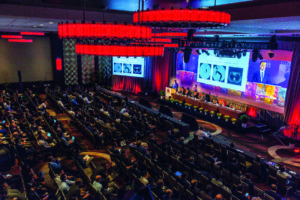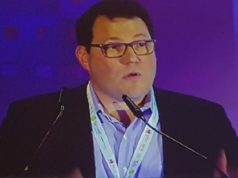
The 2019 GEST (Global Embolization Oncology Symposium Technologies) Symposium took place on 9–12 May in New York, USA, with a new focus this year on trainees and fellows, representing, as co-convenors of the conference Marc Sapoval (Hôpital Européen Georges-Pompidou, Paris, France) and Jafar Golzarian (University of Minnesota, Minneapolis, USA) tell Interventional News, “the future of interventional radiology (IR)”.
This focus was manifested in an increase in trainee attendance and engagement, with 150 medical students from across the globe. New this year, a specific programme dedicated to career development, starting outside the usual conference hours at 7am, was packed. Sapoval enthused about the youth turnout, saying it was “striking to have a room full of people, with an average age of around 25, turning up at that time”. GEST 2019 also played host to a series of case competitions aimed at medical students and trainees. An evening session entitled “Future Meets the Present (…Almost the Past)” saw established interventional radiologists giving their advice to the younger cohort. Justin McWilliams (David Geffen School of Medicine, Los Angeles, USA) spoke about how to approach the first year in practice; Brian Stainken (Stamford Health, Stamford, USA) noted three things he would do differently in his early career were he to start over; Donna D’Souza (University of Minnesota, Minneapolis, USA) outlined her experience of being a successful woman in IR; and Michael Darcy (Mallinckrodt Institute; Washington University, St Louis, USA) detailed what a work/ life balance should look like. These activities and the positive response prompted Golzarian and Sapoval to describe the meeting as “a push for the future” of the specialty.
In addition to an increase in youth turnout specifically, there was a more general increase in attendance this year: a rise of 20%, according to Sapoval. This included approximately 50 new faculty members, meaning the meeting had a faculty more than 150 strong in total. GEST 2019 saw 180 abstracts submitted, and 90 accepted posters. Three of the abstracts received financial prizes, as did the three best posters. There were also three prizes awarded in the case competition aimed at trainees.
The global nature of IR was reflected in the international cohort who attended and organised the GEST meeting. Forty-seven percent of the nearly 1,100 attendees were international (from outside of the USA), and the four committees that help organise the conference programme comprised of a diverse group of volunteers. These committees—focused on research, interventional oncology, training, and workshops—are entirely volunteer-led, and Golzarian and Sapoval thank all those who have invested their time and efforts into GEST 2019: “Their involvement made this meeting our best yet”.

The sessions dedicated to prostate artery embolization (PAE) and portal intervention were attendee favourites. At the end of the PAE Symposium, audience polling revealed that 100% of voters wanted to see the session return next year. Speaking to Interventional News, Golzarian claimed that GEST was “the only meeting that covers these two topics to this degree of detail”. The focus on PAE is a stalwart fixture of the meeting, which has featured a dedicated PAE day since 2012.
Sapoval also spotlighted the flow dynamics session as a high point of the conference, saying: “It was an amazing session”. This was only open to registrants, and, in Golzarian’s words, “covered a lot of ground, including what we need to know but do not yet understand”. He said that flow dynamics was an “important topic” as “it is so essential to what we do in embolization”.

New this year was the “GEST stress test”, based off the American “Shark tank” or the European “Dragon’s Den” concepts, where three innovative interventionalists presented their novel research ideas to a group of expert panellists, who then judged the entrants’ projects. This sparked “excellent debates” and showcased three very different projects, Sapoval comments. “I think it really helped the investigators to focus on their research and hone in on how they could improve their current projects”, he said.
James Spies (MedStar Georgetown University Hospital, Washington, DC, USA) comments: “GEST continues as the premier embolization meeting in the world. It is unique in the breadth of faculty experts, the detailed review of the tools of embolization and the quality of the presentations. The panel discussions have been expanded, where real life cases and questions can be addressed by the leaders in the field. I never fail to learn new things at GEST and it remains my favourite meeting of the year.”
GEST will return to New York, USA, on 14–17 May 2020.













